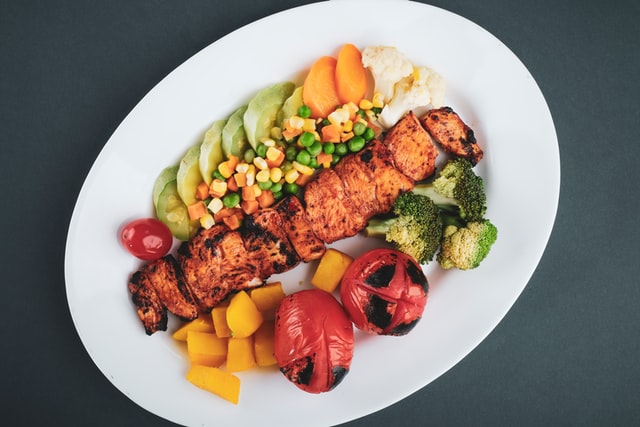Do I think it’s a good excuse? No, it is something you can acknowledge and adapt to balance. Being tossed around by hormonal changes is a reality, but with a little wisdom it is manageable.
Here are my disclaimers… insulin is king of all hormones… don’t even look at your female hormones until you balance insulin. Secondly, we are addressing imbalances that are within the bell curve of normality, not actual diseases that would leave your hormone numbers outside of the bell curve.
Many women have personal experience with hormonal-driven eating, and you rarely hear about the underlying physiology. "Explanations" and comments are often patronizing. Worse, by not discussing the specifics, it can lead women to feel like it's all in their heads. But there is a physiological explanation behind this.
We eat less when our estrogen is high. When estrogen drops and progesterone increases, we eat more and experience more cravings for chocolate, sweets, and salty foods (and food in general).
So here is “menstrual cycle 101.”
The menstrual cycle takes about 28 days and goes through two phases: follicular and luteal. The follicular phase lasts from day 1 of menstruation (bleeding) to ovulation (release of the egg) about 14–15 days later. The luteal phase lasts from ovulation until the next menstruation (so typically from about day 14 to day 28). These phases are regulated by two hormones, estrogen and progesterone. As a side note, you have multiple types of estrogen but for simplicity sake, I will only be addressing estradiol (which is a major estrogen player affecting hunger).

The brain has estradiol sensors (estrogen receptors) which can decrease your food intake and make you feel more content after a meal (increased dopamine binding). When estradiol decreases, those parts of your brain start telling you that you’re not quite full, and you don’t feel quite as content after a meal. This is a response to neurological signals. Estrogen also indirectly affects two hormones, ghrelin and CCK. Ghrelin makes you feel hungry when your stomach is empty. Estradiol decreases ghrelin’s hunger cue partly in your brain and partly by suppressing how much ghrelin your body makes.CCK, which makes you feel full and satiated after you eat. Estradiol helps you feel fuller faster by increasing the potency of CCK. So if you feel like you’re never full or satisfied at certain times of the month, there's a physiological reason behind it.
So now what???
1. Eat slowly. Really slowly, take 20 minutes or more, so you can feel satiated. It is a good habit to practice always, not just during that time of the month.
2. Pay attention to what you want to eat during your luteal phase and be prepared. Find healthy ways to feel satisfied with your food. Planning is usually more helpful than abstaining completely.
3. Try to get seven to nine hours of sleep. Fatigue can upset our hormones and tends to make us eat more.
4. Be prepared for what you know is coming. Things like planning meals, eating from smaller plates, eating with smaller utensils, when you have low estradiol can help you balance your appetite.
5. You can track your morning body temperature. A drop in estradiol is related to an increase in body temperature. Regularly take your temperature when you wake up, before you do anything else, and write it down. A jump in temperature means estrogen is falling (start of the luteal phase).
Health is not solely made at the gym. It’s a lifestyle of priorities, but fitness training is not the first step. Actually, it is about fifth on the priority list.
1. Nutrition- American diets are often atrociously over calories and sub par in nutrients.
2.Sleep- every system repairs, heals, and detoxifies while your sleep.
3. Stress- this can be physical, emotional, chemical or thermal.
4. Daily movement- inactivity is rampant… even parking the car a bit further increases movement.
5. Training- what type of exercise is best? The one you actually do.
Let’s not be sheeple - docile, complacent, or easily influenced. Take control of your actions. It’s not really acceptable to just say, "Oh, it’s my hormones!"
Be steadfast. 1 Corinthians 15:58: Therefore, my beloved brethren, be ye stedfast, unmoveable, always abounding in the work of the Lord, forasmuch as ye know that your labour is not in vain in the Lord.
Be strong. Joshua 1:9: Have not I commanded thee? Be strong and of a good courage; be not afraid, neither be thou dismayed: for the LORD thy God is with thee whithersoever thou goest.
Be ensamples. 1 Corinthians 3:16-17: Know ye not that ye are the temple of God, and that the Spirit of God dwelleth in you?
Joyfully serving her Saviour in her blessed position of wife and mother, Dr. Michelle Zarrillo has a unique perspective on health related issues. As a working chiropractor and an avid reader, she has many opportunities to practice that which she learns. Educating her children at home and discovering their special needs has further challenged her to examine the connection between the physical, mental and spiritual realms of the human nature. Her passion for healthier living and her quest for the Creator’s ways of healing keep her pressing forward in search of truth.
Read Michelle’s salvation testimony here and her articles here.

Comments 2
Thanks for the info! Very helpful to know the science behind the curtain!
I was just curious if you had a certain vitamin regime helps with overall health and weight loss. There is so much “stuff” out there that claims to help with everything. So I was just wandering if you had any recommendations. I am also premenopausal. So any ideas to help with this as well? I don’t want to make an idol out of this issue just trying to get some good Christian counsel on it. Thank you!!